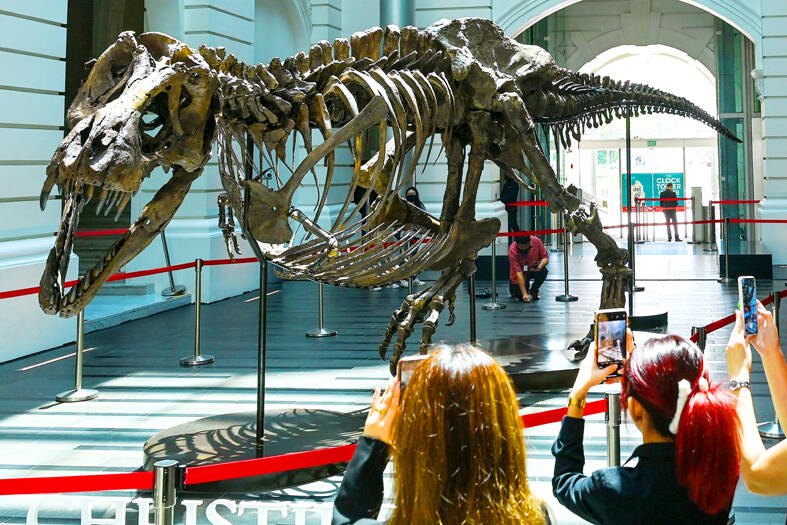Christie’s has called off the auction of a Tyrannosaurus rex skeleton, the auction house said yesterday — days before it was due to go under the hammer in Hong Kong.
The cancelation came after a US fossil company raised doubts about parts of the skeleton named “Shen,” the New York Times reported on Sunday.
Christie’s said in a statement that Shen — a 1,400kg skeleton — was withdrawn from its autumn auctions week that starts in Hong Kong on Friday.

Photo: AFP
“The consignor has now decided to loan the specimen to a museum for public display,” it said.
Excavated from the US state of Montana, Shen stands 4.6m tall and 12m long, and is thought to be an adult male that lived about 67 million years ago.
Its auction would have followed the sale of another T-rex skeleton named “Stan” by Christie’s for US$31.8 million in 2020.
It is very rare for complete dinosaur skeletons to be found, according to The Field Museum in Chicago, one of the largest natural history museums in the world.
Most frames on display use casts of bones to complete the skeleton. The Field Museum estimates the number of bones in a T-rex at 380.
Christie’s original materials said about 80 of Shen’s bones were original.
The controversy was sparked when Peter Larson, president of the Black Hills Institute of Geological Research in the US, told the New York Times that parts of Shen looked similar to Stan.
The institute holds the intellectual property rights to Stan, even after its sale in 2020, and it sells replicas of that skeleton
Larson told the newspaper that it seemed to him that Shen’s owner — not identified by Christie’s — used bones from a Stan replica to complete the skeleton.
Its spokesman, Edward Lewine, told the newspaper that Christie’s believes Shen “would benefit from further study.”
Sales of such skeletons have raked in tens of millions of dollars in recent years, but experts have described the trade as harmful to science, as the auctions could put them in private hands and out of the reach of researchers.

Stephen Garrett, a 27-year-old graduate student, always thought he would study in China, but first the country’s restrictive COVID-19 policies made it nearly impossible and now he has other concerns. The cost is one deterrent, but Garrett is more worried about restrictions on academic freedom and the personal risk of being stranded in China. He is not alone. Only about 700 American students are studying at Chinese universities, down from a peak of nearly 25,000 a decade ago, while there are nearly 300,000 Chinese students at US schools. Some young Americans are discouraged from investing their time in China by what they see

MAJOR DROP: CEO Tim Cook, who is visiting Hanoi, pledged the firm was committed to Vietnam after its smartphone shipments declined 9.6% annually in the first quarter Apple Inc yesterday said it would increase spending on suppliers in Vietnam, a key production hub, as CEO Tim Cook arrived in the country for a two-day visit. The iPhone maker announced the news in a statement on its Web site, but gave no details of how much it would spend or where the money would go. Cook is expected to meet programmers, content creators and students during his visit, online newspaper VnExpress reported. The visit comes as US President Joe Biden’s administration seeks to ramp up Vietnam’s role in the global tech supply chain to reduce the US’ dependence on China. Images on

New apartments in Taiwan’s major cities are getting smaller, while old apartments are increasingly occupied by older people, many of whom live alone, government data showed. The phenomenon has to do with sharpening unaffordable property prices and an aging population, property brokers said. Apartments with one bedroom that are two years old or older have gained a noticeable presence in the nation’s six special municipalities as well as Hsinchu county and city in the past five years, Evertrust Rehouse Co (永慶房產集團) found, citing data from the government’s real-price transaction platform. In Taipei, apartments with one bedroom accounted for 19 percent of deals last

US CONSCULTANT: The US Department of Commerce’s Ursula Burns is a rarely seen US government consultant to be put forward to sit on the board, nominated as an independent director Taiwan Semiconductor Manufacturing Co (TSMC, 台積電), the world’s largest contract chipmaker, yesterday nominated 10 candidates for its new board of directors, including Ursula Burns from the US Department of Commerce. It is rare that TSMC has nominated a US government consultant to sit on its board. Burns was nominated as one of seven independent directors. She is vice chair of the department’s Advisory Council on Supply Chain Competitiveness. Burns is to stand for election at TSMC’s annual shareholders’ meeting on June 4 along with the rest of the candidates. TSMC chairman Mark Liu (劉德音) was not on the list after in December last